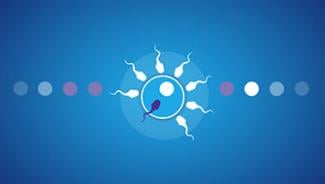Fertility medications 101: General information about fertility drugs

Talking to your healthcare provider is especially important when considering potential fertility medications. This article is for general information only; it does not constitute medical advice nor should it be construed to do so.
If you’ve been trying to conceive (TTC) for more than a year, you may be wondering if fertility medications are in your future. And if a quick search online or a conversation with a friend who’s gone down this path has you feeling overwhelmed, just remember: You are not expected to be an expert! Lean on your healthcare provider, who will walk you through the best options for you. And in the meantime, below is a general snapshot of some common fertility medications your doctor may talk to you about.

Clomiphene citrate
Clomiphene citrate helps with ovulation by stimulating the production of follicle-stimulating hormone (FSH).1 Higher levels of FSH trigger the follicles to develop and secrete a hormone called estradiol into the blood.1 Higher levels of estradiol cause a luteinizing hormone (LH) surge, which triggers the release of an egg (aka ovulation).1 Your healthcare provider may prescribe clomiphene citrate to be used alone or in conjunction with other fertility treatments.2
- Form: Tablets1
- How it’s used: Talk to your healthcare provider. You may start with a standard dose determined by your doctor based on your medical history and specific considerations. If ovulation doesn’t occur, the dose may be increased and may be repeated.
- Possible side effects: According to the National Library of Medicine DailyMed website, potential side effects can include visual symptoms including blurring, abdominal and/or pelvic pain or distention due to ovarian enlargement, breast tenderness, hot flashes, nausea, vomiting and headaches.3 These side effects are more frequent at higher doses.1 If your healthcare provider prescribed clomiphene citrate and you experience any of these side effects, reach out to them as soon as possible to discuss.
- Good to know: According to the American Society for Reproductive Medicine, “Women who conceive with clomiphene have approximately a 10% chance of having twins.”1

Gonadotropins: injectable fertility drugs
Gonadotropins are various hormones that can be injected to help trigger ovulation.4,5 Your healthcare provider may recommend gonadotropins if other fertility medications don’t work or if many eggs are needed (e.g., for IVF treatment).4,5
Many different types of gonadotropins are prescribed for fertility treatments.4 If you research gonadotropins online, try not to feel overwhelmed by all the different types of hormones and brand names. If your healthcare provider recommends this treatment, they will provide you with a comprehensive overview of your options.
- Form: Injectable1
- How they’re used: Talk to your healthcare provider; they’ll discuss the specific schedule for receiving gonadotropin injections. Typically, gonadotropin fertility treatments involve a series of injections administered early in the menstrual cycle.4
- Possible side effects: Gonadotropin side effects vary depending on the hormone injected.1 Your healthcare provider will go over possible side effects with you before treatment. In some cases, documented side effects include tenderness, infection, blood blisters, rash, swelling and/or bruising at the injection site.1,5 Additional side effect warnings include mood swings, depression, breast tenderness and ovarian hyperstimulation.1,5 If your healthcare provider prescribes an injectable fertility drug and you experience side effects, be sure to let them know right away.
- Good to know: Your healthcare provider may run blood tests and/or ultrasounds to oversee the development of your follicles.4 Another drug may be used to trigger the release of egg(s).4 If gonadotropins are administered, there is an increased chance of multiple births.1,5

Ganirelix acetate
According to the Mayo Clinic, ganirelix acetate helps “prevent premature luteinizing hormone (LH) surges or ovulation in women undergoing fertility treatment.”6Wait a second, you may be thinking. Why would I want that? Getting the timing right is key in pregnancy, and this particular treatment helps by ensuring ovulation doesn’t happen earlier than expected.
- Form: Injectable1
- How it’s used: Talk to your healthcare provider. Typically, after receiving an FSH treatment on the second or third day of your menstrual cycle, a prescribed amount of ganirelix acetate is injected daily for about five days during your menstrual cycle.6
- Possible ganirelix acetate side effects: Your healthcare provider will review the possible side effects of this treatment, which may include stomach pain, bloating, diarrhea, rapid weight gain or headache.5,6 If you experience any of these side effects, make sure to talk with your healthcare provider right away.
- Good to know: This treatment is typically used to help fertility specialists create a controlled environment when performing ovarian hyperstimulation during IVF, making the menstrual cycle more predictable.7

Cabergoline and bromocriptine
Some people don’t ovulate because they produce higher-than-normal levels of prolactin, which halts the release of FSH and LH. In these cases, healthcare providers may prescribe cabergoline or bromocriptine, which may reduce the amount of prolactin released by the pituitary gland.1
- Form: Tablets1
- How they’re used: Talk to your healthcare provider. Depending on the drug, they may prescribe tablets to be taken routinely, such as daily or twice weekly.1
- Possible side effects: Your healthcare provider will discuss possible side effects of cabergoline and bromocriptine, which could include a stuffy nose, tiredness, headaches, nausea or vomiting, dizziness or fainting, or decreased blood pressure.1 If you experience any of these side effects, contact your healthcare provider.
- Good to know: When taken without other fertility drugs, cabergoline and bromocriptine do not increase the chances of a multiple pregnancy.1
Starting — or even just thinking about — fertility treatments may feel overwhelming at first, but establishing a good line of communication with your healthcare provider can help ease your concerns and get you answers to your questions. While your path to pregnancy may not be what you envisioned, know that many options exist.
Related Articles
Sources
- American Society for Reproductive Medicine. Medications for inducing ovulation (booklet). Accessed August 22, 2023. http://www.fertilitymemphis.com/wp- content/uploads/2015/07/Medications-for-Inducing-Ovulation-booklet.pdf
- Mbi Feh MK, Wadhwa R. Clomiphene. Statpearls. National Library of Medicine. Updated June 27, 2022. Accessed May 29, 2023. https://www.ncbi.nlm.nih.gov/books/NBK559292/
- National Library of Medicine DailyMed. Clomid – clomiphene citrate tablet. Updated February 2023. Accessed September 7, 2023. https://dailymed.nlm.nih.gov/dailymed/lookup.cfm?setid=f15e9918-6001-4150-bd54- 1364a6febcb8
- The American College of Obstetricians and Gynecologists. Treating infertility. Updated August 2022. Accessed May 29, 2023. https://www.acog.org/womens-health/faqs/treating-infertility
- WebMD. Fertility drugs. Updated July 14, 2023. Accessed September 7, 2023. https://www.webmd.com/infertility-and-reproduction/guide/fertility-drugs
- Mayo Clinic. Ganirelix (subcutaneous route). Updated February 1, 2023. Accessed May 29, 2023. https://www.mayoclinic.org/drugs-supplements/ganirelix-subcutaneous-route/precautions/drg- 20064001?p=1
- Resolve. Types of medications. Accessed June 2, 2023. https://resolve.org/learn/what-are-my- options/medications/types-of-medications/

Get pregnant naturally
Ovulation tests are accurate and simple to use.

How to get pregnant faster
There are a few key things you need to know if you want to maximise your chances of getting pregnant.




